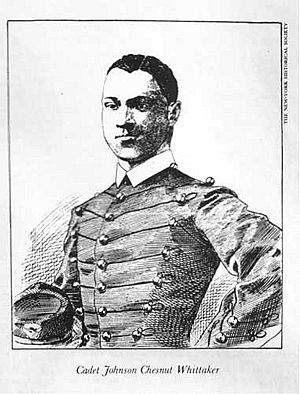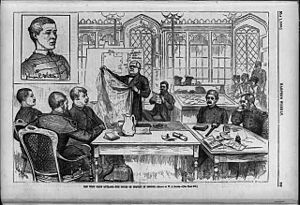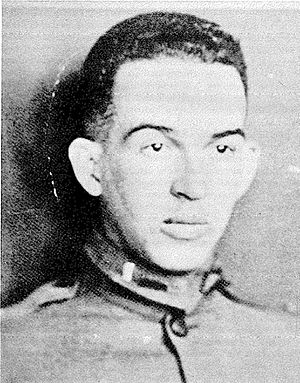Johnson Chesnut Whittaker facts for kids
Quick facts for kids
Johnson Chesnut Whittaker
|
|
|---|---|

Johnson Chesnut Whittaker as a West Point Cadet.
|
|
| Born | August 23, 1858 |
| Died | January 14, 1931 (aged 72) |
| Resting place | Orangeburg Cemetery, Orangeburg, South Carolina |
| Education | University of South Carolina United States Military Academy |
| Occupation | School teacher, school administrator, college professor, attorney |
Johnson Chesnut Whittaker (born August 23, 1858 – died January 14, 1931) was an important figure in American history. He was one of the first African American men to be accepted into the United States Military Academy in West Point, New York. While at West Point, he faced a terrible injustice. He was attacked and then unfairly kicked out after being wrongly accused of faking the incident. More than 60 years after his death, his name was finally cleared. President Bill Clinton officially recognized him as an officer in the US Army in July 1995.
Contents
Early Life and Education
Johnson Chesnut Whittaker was born into slavery in Camden, South Carolina. This was on the Chesnut Plantation. He was a very bright student. He studied privately with Richard Theodore Greener. Greener was the first African American to graduate from Harvard.
Whittaker later attended the University of South Carolina. At that time, it was a school for freed slaves. In 1876, he received an appointment to the United States Military Academy at West Point. This appointment came from South Carolina Representative Solomon L. Hoge. For most of his time at West Point, Whittaker was the only black cadet. His white classmates often ignored him.
The West Point Incident
On April 5, 1880, something terrible happened. Whittaker was found tied to his bed. He was unconscious, bleeding, and bruised. His hands and face had cuts from a razor. Pages from his Bible were burned and scattered around his room.

Whittaker told the school leaders that three other cadets had attacked him. However, his story was not believed. West Point officials claimed he had made up the attack to get sympathy.
Whittaker's case went before a special inquiry. He was defended by Martin I. Townsend and his friend, Richard Greener. Eventually, he was granted a court-martial, which is like a military trial. After more than a year of hearings, Whittaker was found responsible for staging the attack in 1881. He was then expelled from West Point.
The person arguing against him, Major Asa Bird Gardiner, made unfair comments about "inferior" and "superior" races. He said that "Negroes are noted for their ability to sham and feign." Whittaker's defense was led by Daniel Henry Chamberlain, with help from Greener.
In 1883, President Chester A. Arthur overturned the decision. This meant Whittaker was innocent. However, West Point immediately reinstated his expulsion. They claimed he had failed an exam.
Life After West Point
After leaving West Point, Whittaker became a teacher. He also became a lawyer. He worked as a high school principal in Oklahoma City. Later, he was a psychology professor in South Carolina. Johnson Chesnut Whittaker passed away in Orangeburg, South Carolina, in 1931. He was buried in Orangeburg Cemetery.
Whittaker's family continued to serve their country. His sons, Johnson Whittaker Jr. and Miller Whittaker, both served as Army officers in World War I. His grandson, Peter H. Whittaker, joined the all-black Tuskegee Airmen in World War II. A great-grandson, Ulysses W. Boykin III, served in the Army during the Vietnam War. He later became a judge.
Clearing His Name
In 1972, a historian named John Marszalek wrote a book about Whittaker. This book brought attention to his unfair treatment. In 1994, a TV movie based on the book was shown. This helped build support to officially recognize Whittaker as an officer.
On July 25, 1995, President Bill Clinton honored Whittaker. He awarded the commission to Whittaker's family. President Clinton said, "We cannot undo history. But today, finally, we can pay tribute to a great American and we can acknowledge a great injustice." This act finally cleared Johnson Chesnut Whittaker's name.
In Popular Culture
Johnson Whittaker's story has been shared in popular culture.
- Assault at West Point: The Court-Martial of Johnson Whittaker is a 1994 TV movie. It tells the story of his case.
- Matter of Honor is a stage play by Michael Chepiga. It retells Whittaker's time at West Point. The play was performed at the Pasadena Playhouse in California in 2007.
See also
- Henry Ossian Flipper, the first African American to graduate from West Point in 1877.
 | Valerie Thomas |
 | Frederick McKinley Jones |
 | George Edward Alcorn Jr. |
 | Thomas Mensah |


